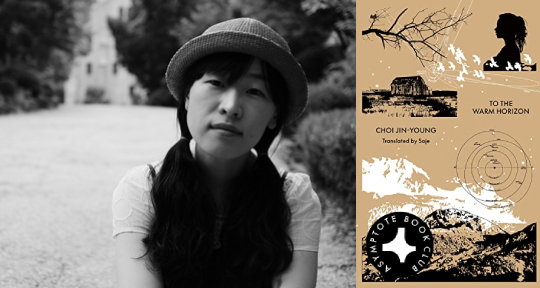As pandemic literature carves out a space of its own in contemporary letters, such writings unveil what is seemingly opaque or inscrutable about the presumed normalcy of “the before times.” In our Book Club selection for May, To the Warm Horizon, Choi Jin-young sketches a fragmentary, kaleidoscopic tale of survival and longing in the aftermath of a global catastrophe triggered by illness. The focus, however, is not on contagion itself. Instead, it falls on the variety of ways in which human interactions unfold within a more general dynamic of contrasting forces: fear and hope, reason and unreason, cruelty and love.
The Asymptote Book Club aspires to bring the best in translated fiction every month to readers around the world. You can sign up to receive next month’s selection on our website for as little as USD15 per book; once you’re a member, join our Facebook group for exclusive Book Club discussions and receive invitations to our members-only Zoom Q&As with the author and/or the translator of each title!
To the Warm Horizon by Choi Jin-young, translated from the Korean by Soje, Honford Star, 2021
Among the many side effects of the pandemic, we have witnessed a global reawakening of the taste for narratives of contagion, (post-)apocalyptic scenarios, and disaster fiction. If in March 2020, readers rushed to revisit the classics (Boccaccio’s Decameron, Defoe’s A Journal of the Plague Year, or Camus’s The Plague), the public quickly moved to explore newer works as the pandemic stretched on, such as Margaret Atwood’s Oryx and Crake (2003) and Emily St. John Mandel’s Station Eleven (2014). The early months of 2021 came with an entirely new crop of contemporary writing, whose publication in English translation was likely encouraged—if not sped up—by the timeliness of their subject matter. Choi Jin-young’s To the Warm Horizon, published originally in Korean in 2017 and in Soje’s translation in 2021, is an example of the newly acquired popularity of these viral themes.
An unnamed virus serves only as a distant background for the five first-person narrators whose voices echo one another in this book, wherein the disastrous toll of hundreds of thousands of victims a day has decimated the population of the globe in a matter of days, setting in motion massive flows of refugees headed for an ever-distant promise of warmth and safety lurking on the horizon. Not much is disclosed about the disease itself, except that it provokes a rapid death; Choi Jin-young focuses instead on the possibilities for love and caring connections in a time of societal breakdown and civilizational disarray.
Countering the entropy of a world in dissolution, the narrative stitches together twenty kaleidoscopic chapters, in which five nomadic voices each offer their own experience of the events. The fragments are titled after their narrators and read like curated journal entries, varying in length and intensity. Amongst the speakers, Dori and Jina are given the most depth and contour; they speak for themselves as queer women, and their burgeoning romantic relationship is at the core of the novel. Ryu is the spokesperson for her family’s story, while Joy and Gunji are episodic storytellers whose accounts center on their own desires. READ MORE…


